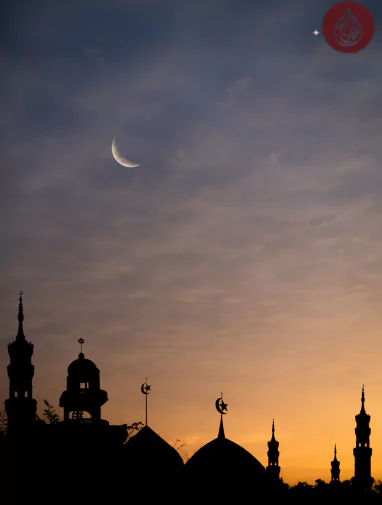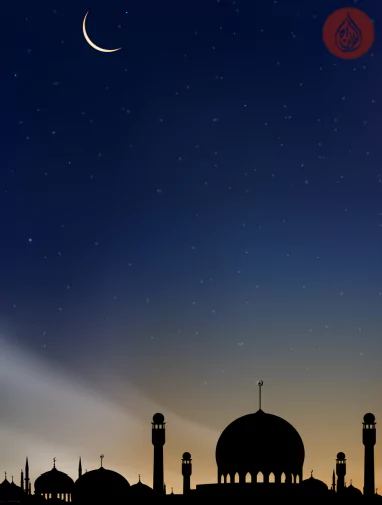Muharram 2025 marks the beginning of the Islamic New Year 1447 Hijri, a time of reflection, devotion, and spiritual renewal for Muslims around the world. As the first month of the Islamic calendar, Muharram holds immense significance, especially the 10th of Muharram (Ashura), which commemorates pivotal events in Islamic history, such as the Prophet Muhammad’s (S.A.W.) migration and the martyrdom of Imam Husain (R.A.) at Karbala.
Muslims are encouraged to observe acts of worship during this holy month, including charity, fasting, and prayer, as well as to reflect on the spiritual lessons of justice, sacrifice, and faith. As-Siraj, a charity in the UK, plays a key role in promoting these values and supporting the community during this blessed time.
Understanding the Islamic Hijri Calendar
Muslims around the world use the Hijri calendar, which is also known as the Islamic calendar. Unlike the Gregorian calendar, which is solar-based, the Hijri calendar follows the cycles of the moon. This calendar has twelve months, with each month beginning with the moon sighting. The first month of this calendar is Muharram, which holds particular significance as the start of the Islamic year 1447 Hijri. The moon sighting for Muharram marks the beginning of this sacred month, and Muslims eagerly await this moment to begin their spiritual reflections and observances.
When Does Islamic New Year starts in 2025?
The first sighting of the new moon, which signals the beginning of Muharram, will mark the beginning of the Islamic New Year 1447 Hijri in 2025. The Muharram 2025 date is crucial, as it sets the tone for the entire year in the Islamic faith. The moon sighting for Muharram is done with careful observation, and the date of 1st Muharram 2025 may vary by a day or two depending on the location.
As the Islamic year begins, Muslims all over the world prepare for the spiritual practices that Muharram brings. The Islamic New Year is a time of introspection and devotion, reminding Muslims of their commitments to faith. It also serves as a time to reflect on the lessons of the Prophet Muhammad’s (S.A.W.) His hijrah, or journey from Mecca to Medina, took place this month and marked a pivotal moment in Islamic history.
The Significance of the Islamic New Year
Muharram, the first month of the Islamic year 1447 Hijri, is a time of great importance in Islam. The blessings of Muharram are profound, as it marks the beginning of a new chapter in the Islamic calendar 2025. Muharram is a sacred month, one of the four sacred months in Islam when fighting and violence are prohibited.
In Islamic history, Ashura, or the tenth of Muharram, holds particular significance. During this month, Muslims reflect on the Prophet Muhammad’s (S.A.W.) migration, the Hijrah, and other pivotal events in Islamic history. The prophet’s last Hajj sermon is often recalled during this time, as it contains lessons that remain relevant today. Muharram is a time to start fresh spiritually, drawing closer to Allah through prayer, fasting, and charity.
Virtues and Blessings of the Islamic New Year
Muharram is a month filled with great blessings and virtues. Fasting during this month, especially on the 9th and 10th of Muharram, is highly recommended in Islam. The Prophet Muhammad (S.A.W.) supported the Sunnah fasting during the month of Muharram, which is a means of securing significant rewards from Allah. All acts of worship and charity are eligible for Muharram’s blessings, so fasting is not the only option.
What is Hijrah Sharif and Its Historical Context?
The term Hijrah Sharif refers to the migration of the Prophet Muhammad (S.A.W.) from Mecca to Medina. This event occurred during the month of Muharram, marking the beginning of the Islamic calendar. The Hijrah is not just a physical journey but also a spiritual one, symbolizing the shift from hardship to success, from oppression to freedom.
The historical significance of Muharram lies in this migration, as it was the turning point in the Prophet’s (S.A.W.) mission. The migration of Prophet Muhammad (S.A.W.) to Medina was a pivotal moment in Islamic history, establishing the foundation for the spread of Islam and the creation of the first Islamic state. This significant event is remembered during Muharram, serving as a reminder of the early sacrifices made in the name of faith.
The Significance of the 1st Muharram in Islam: A Day of Reflection
The 1st Muharram is not just the start of the Islamic year but also a day of deep reflection for Muslims. On this day, Muslims remember the Hijrah and the early struggles of the Prophet Muhammad (S.A.W.). It is a time to reflect on the past and renew one’s commitment to faith and spiritual growth.
This day is observed with prayer and introspection. Many Muslims visit mosques and engage in special prayers to mark the beginning of the new year. It is an opportunity to contemplate the Islamic calendar 2025 and how one can make the most of the coming year by increasing acts of devotion and good deeds.
Observances and Recommendations for the 1st of Muharram
On the first of Muharram, Muslims devote themselves to acts of worship and spiritual reflection. It is encouraged to offer additional prayers and supplications (dua) to seek Allah’s blessings for the year ahead. Engaging in charitable activities during this time is highly recommended, as giving brings immense rewards.
Muslims are urged to focus on self-purification and set spiritual goals for the upcoming year. Fasting during Muharram is of great importance, with many observing fasts on the 9th and 10th of Muharram to follow the Sunnah fasting Muharram. This fasting serves to purify the soul and fortify one’s faith..
Ashura: The Significance and Observance of the 10th Day of Muharram
The 10th of Muharram, known as Ashura, is one of the most significant days in the Islamic calendar. This day commemorates the martyrdom of Imam Husain (R.A.) at Karbala. His sacrifice is a symbol of standing up for truth and justice in the face of oppression.
Ashura also holds special significance in Sunni and Shia traditions. While Shia Muslims mourn the Karbala incident, Sunnis observe fasting on Ashura as a means of drawing closer to Allah. The Day of Ashura significance extends beyond the historical event and serves as a reminder of the importance of justice, sacrifice, and faith in Islam.
Fasting on Ashura: Benefits and Rewards
Fasting on the 9th and 10th of Muharram holds tremendous spiritual significance. It is considered a Sunnah fasting Muharram and is believed to bring great rewards. The Prophet Muhammad (S.A.W.) encouraged fasting on Ashura as it serves as an expiation for sins.
The Ashura fasting Sunnah helps Muslims cleanse their souls and come closer to Allah. It is a day of gratitude, where Muslims express their thankfulness for the blessings they have received. Fasting on this day is a deeply spiritual practice, with immense spiritual benefits.
Mourning and Reflection: The Heartbreaking Events of Ashura
The Ashura rituals in Islam are a period of mourning, especially for Shia Muslims, as they commemorate the martyrdom at Karbala. The tragic death of Imam Husain (R.A.) and his companions in the battle of Karbala is commemorated with processions, prayers, and emotional reflection.
This tragic event serves as a reminder of the need to stand up for justice, even in the face of great adversity. It is a time for Muslims to reflect on the sacrifice made by Imam Husain (R.A.) and his followers, who chose to protect their faith rather than compromise with oppression.
Superstitions and Misconceptions About Muharram
There are many misconceptions about Ashura and Muharram. Some people mistakenly associate the month with bad luck or superstitions, which are far removed from the true teachings of Islam. It is important to debunk Ashura myths and focus on the spiritual and historical aspects of the month.
The Islamic rituals Muharram should be observed with the right intentions and a focus on spiritual growth rather than cultural misunderstandings. Misunderstood practices Muharram should be addressed, emphasizing the true meaning of the month and the blessings of fasting during Muharram.
The Importance of Muharram in Islam
Muharram is an essential part of the Islamic calendar 2025. It serves as a time to renew faith, reflect on the past year, and prepare for the challenges ahead. The sacred month of Muharram is a period of spiritual purification and growth, making it one of the most important times in the Islamic year.
The significance of Ashura day and the lessons drawn from the events of Karbala are central to understanding the importance of Muharram in Islam. It is a time to re-commit to the principles of justice, sacrifice, and truth.
Fasting During Muharram: A Deep Spiritual Practice
Fasting during Muharram serves as a profound spiritual practice for Muslims. It is a way to purify the soul, increase devotion, and seek Allah’s forgiveness. The blessings of fasting during Muharram cannot be overstated, and it is a key element of the Islamic rituals Muharram.
The practice of Sunnah fasting Muharram offers Muslims an opportunity to align their actions with the Prophet’s teachings and earn immense rewards from Allah. It is an act of devotion that serves to strengthen the spiritual connection between the individual and their Creator.
FAQs
Why don’t Sunnis mourn in Muharram?
Sunnis do not mourn in Muharram because they focus on fasting and reflection rather than mourning, as they believe in commemorating the martyrdom of Imam Husain (R.A.) through acts of worship and remembrance, not grief.
What is Muharram in Islam in 2025?
Muharram 2025 marks the start of the Islamic year 1447 Hijri, a sacred month for spiritual reflection, fasting, and remembrance, especially the 10th of Muharram, known as Ashura.
What is on 9 and 10 Muharram?
On the 9th and 10th of Muharram, Muslims observe fasting, following the Sunnah fasting Muharram, with special significance on the 10th of Muharram (Ashura), commemorating the martyrdom of Imam Husain (R.A.) and other key events.
Why is 10 Muharram special?
The 10th of Muharram (Ashura) is special because it marks significant events in Islamic history, including the Karbala incident and the prophet’s migration, and it is a day of fasting and reflection.
What do Shias do on 9 Muharram?
On the 9th of Muharram, Shia Muslims prepare for the mourning of Ashura by engaging in rituals such as reciting elegies, reflecting on the martyrdom of Imam Husain (R.A.), and participating in processions to remember the Karbala tragedy.
Conclusion
In conclusion, Muharram 2025 offers Muslims a profound opportunity to reflect on their faith, renew their commitment to spiritual growth, and honor the significant events of Islamic history, including the Hijrah and the Karbala incident. The Islamic New Year is a time for Muslims to deepen their devotion, engage in charity, and offer prayers, drawing closer to Allah through fasting, especially on the 10th of Muharram, known as Ashura. As we observe the blessings of Muharram, it is essential to remember the historical and spiritual lessons that this sacred month brings.
Organizations like As-Siraj play an important role in facilitating these spiritual observances. By offering guidance, supporting charitable activities, and helping the community engage with the deeper significance of Muharram, As-Siraj ensures that the month remains a time for personal growth and collective support. As we move forward into the new Hijri year 1447, let us strive to embrace the lessons of Muharram—standing for justice, reflecting on the sacrifices of Imam Husain (R.A.), and continuing our journey of faith with humility and devotion.






